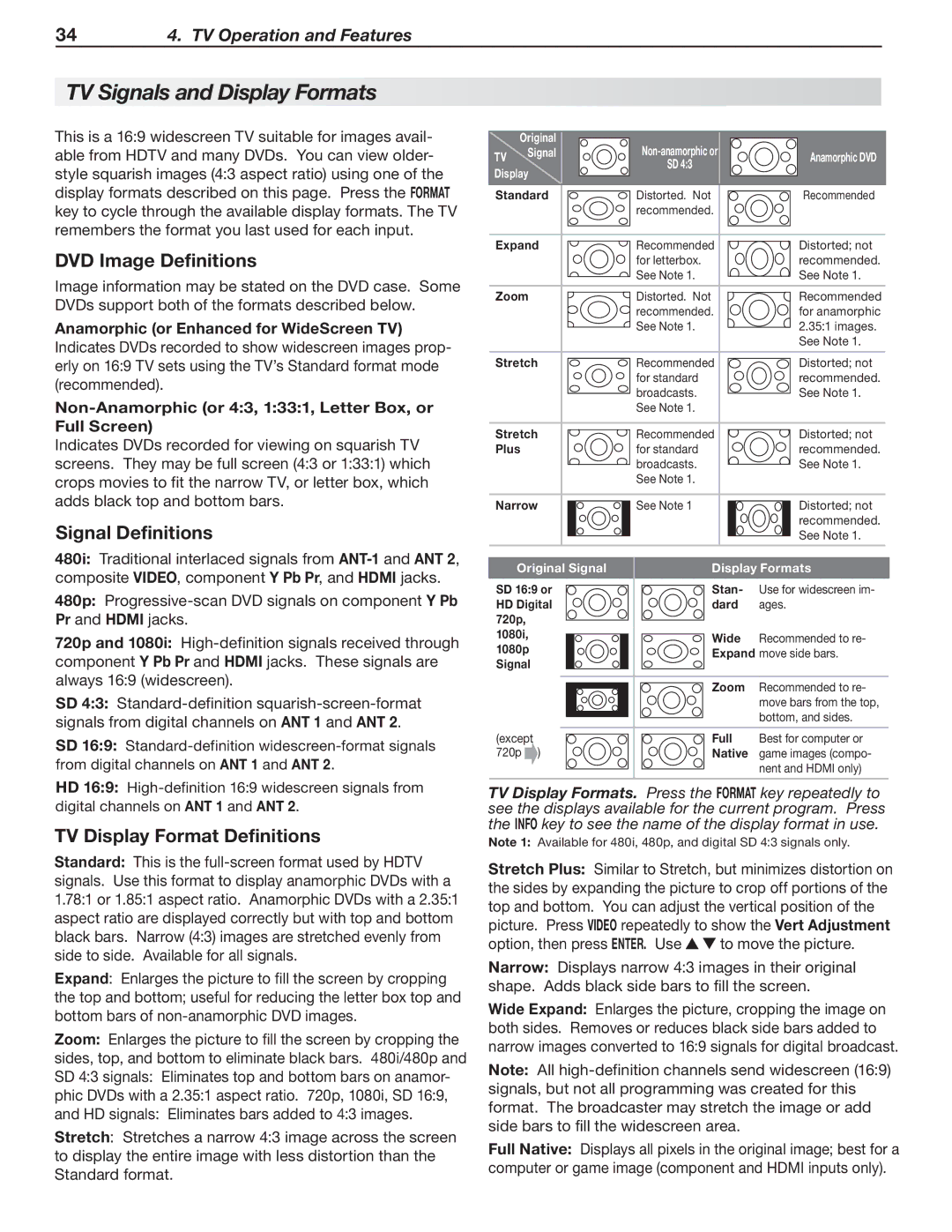
344. TV Operation and Features
TV Signals and Display Formats
This is a 16:9 widescreen TV suitable for images avail- able from HDTV and many DVDs. You can view older- style squarish images (4:3 aspect ratio) using one of the display formats described on this page. Press the FORMAT key to cycle through the available display formats. The TV remembers the format you last used for each input.
DVD Image Definitions
Image information may be stated on the DVD case. Some DVDs support both of the formats described below.
Anamorphic (or Enhanced for WideScreen TV) Indicates DVDs recorded to show widescreen images prop- erly on 16:9 TV sets using the TV’s Standard format mode (recommended).
Indicates DVDs recorded for viewing on squarish TV screens. They may be full screen (4:3 or 1:33:1) which crops movies to fit the narrow TV, or letter box, which adds black top and bottom bars.
Signal Definitions
| Original |
| |
TV | Signal | Anamorphic DVD | |
| SD 4:3 | ||
Display |
| ||
|
| ||
Standard | Distorted. Not | Recommended | |
|
| recommended. |
|
Expand | Recommended | Distorted; not | |
|
| for letterbox. | recommended. |
|
| See Note 1. | See Note 1. |
Zoom | Distorted. Not | Recommended | |
|
| recommended. | for anamorphic |
|
| See Note 1. | 2.35:1 images. |
|
|
| See Note 1. |
Stretch | Recommended | Distorted; not | |
|
| for standard | recommended. |
|
| broadcasts. | See Note 1. |
|
| See Note 1. |
|
Stretch | Recommended | Distorted; not | |
Plus | for standard | recommended. | |
|
| broadcasts. | See Note 1. |
|
| See Note 1. |
|
Narrow | See Note 1 | Distorted; not | |
|
|
| recommended. |
|
|
| See Note 1. |
480i: Traditional interlaced signals from
480p:
720p and 1080i:
SD 4:3:
SD 16:9:
Original Signal
SD 16:9 or HD Digital 720p, 1080i,
1080p Signal
(except 720p ![]() )
)
Display Formats
Stan- Use for widescreen im- dard ages.
Wide Recommended to re- Expand move side bars.
Zoom Recommended to re- move bars from the top, bottom, and sides.
Full Best for computer or Native game images (compo-
nent and HDMI only)
HD 16:9:
TV Display Format Definitions
Standard: This is the
Expand: Enlarges the picture to fill the screen by cropping the top and bottom; useful for reducing the letter box top and bottom bars of
Zoom: Enlarges the picture to fill the screen by cropping the sides, top, and bottom to eliminate black bars. 480i/480p and SD 4:3 signals: Eliminates top and bottom bars on anamor- phic DVDs with a 2.35:1 aspect ratio. 720p, 1080i, SD 16:9, and HD signals: Eliminates bars added to 4:3 images.
Stretch: Stretches a narrow 4:3 image across the screen to display the entire image with less distortion than the Standard format.
TV Display Formats. Press the FORMAT key repeatedly to see the displays available for the current program. Press the INFO key to see the name of the display format in use.
Note 1: Available for 480i, 480p, and digital SD 4:3 signals only.
Stretch Plus: Similar to Stretch, but minimizes distortion on the sides by expanding the picture to crop off portions of the top and bottom. You can adjust the vertical position of the picture. Press VIDEO repeatedly to show the Vert Adjustment
option, then press ENTER. Use ![]()
![]() to move the picture.
to move the picture.
Narrow: Displays narrow 4:3 images in their original shape. Adds black side bars to fill the screen.
Wide Expand: Enlarges the picture, cropping the image on both sides. Removes or reduces black side bars added to narrow images converted to 16:9 signals for digital broadcast.
Note: All
Full Native: Displays all pixels in the original image; best for a computer or game image (component and HDMI inputs only).
